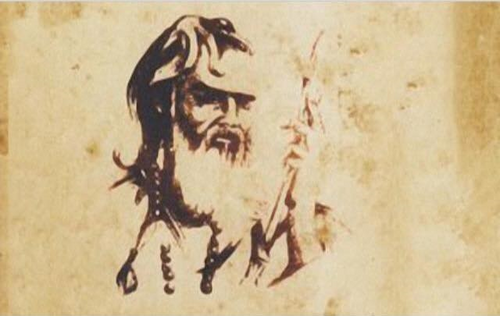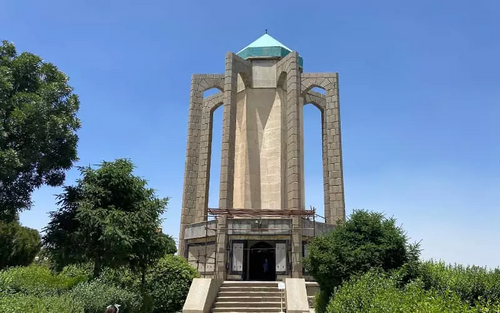"Baba Tahir Hamadani" known as "Baba Tahir Oryan" is one of the well-known Yarsan figures and poets. He was originally Kurd which will be discussed in this article. They named him "Baba" because "Baban, Babe, Bave" are some titles that are used for the Yarsan religious leaders, and in Kurdistan, they are known as "Pir". Some sources mention that Baba Tahir Hamadani was born in 999 AD and died in 1058 AD living during the Seljuk Empire in Iran; some others say he had lived from 937 to 1010 AD.
He has mentioned his date of birth in one of his couplets based on Abjad letters that based on "Mirza Mahdi Khan Kawkab" it was estimated to be 326 Hijri and based on "Rashid Yasami" and according to that same couplet he estimated that Baba Tahir must have meant number one thousand which makes his date of birth 390 or 391 Hijri which was equal to one thousand AD. According to this, Baba Tahir Oryan had lived for 85 years in Hamadan and died in that city.
Baba Tahir Oryan's sweet and philosophical couplets possess folklore insights which means that ordinary people could have read and understood them. Even the illiterate people can understand the meaning of his beautiful, philosophical, and mystic couplets. The main reason for Baba Tahir's popularity of poems among people is the simple form of them that makes it easy for everyone to understand them. The reason for Baba Tahir to be called "Oryan" (Naked) is that his philosophical, mystic couplets and poems were not covered in hard literary and meaningful words. In fact, the simplicity of his poems is the same as their simple meanings.

Baba Tahir Oryan was one of those people who never paid attention to the worldly life believing that real life is found beyond this world. He behaved cautiously and never mentioned the beauties of this world or the materialistic properties of it in his poems. He was known as a Sufi or even Ahl Haq; this is clearly seen in his poems in which he talks about good manners, nature, and righteousness looking at these subjects via the Yarsan perspective.
According to "Baba Tahir Hamadani's Quatrains" prepared and edited by "Rahim Loqmani", a writer, and researcher from the East part of Kurdistan, Baba Tahir Hamadani was a Kurdish man mentioned this in his book: "Baba Tahir's poetic language is an old form of Laki-Lori dialect of Kurdish popular in Hamadan in the past that can be heard even now in some of the villages around Hamadan which is originally under the influence of Hawrami Kurdish dialect." According to this book: "Baba Tahir was a Yarsan religion follower and these people are originally Kurdish people living in Kurdistan."
As it was mentioned, Baba Tahir lived during the Saljuki era, and according to "Comfort of Publishing and Verse of Pleasure in the History of Saljukis" written by "Mohammad son of Ali Suleiman Rawandi", Baba Tahir met "Sultan Bag Tokhrol Bag". In this book, we read:
"When Sultan Tokhrol Bag came to Hamadan, he saw three Sufis named Baba Tahir, Bab Jafar, and Sheikh Hamsha standing near Khedr Mountain next to Hamadan gate. When the Sultan saw them, he ordered his soldiers to halt and got off his horseback back and he went to meet them respectfully with his minister, Abu Nasir Kandari, and bowed to kiss their hands.

Baba Tahir spoke with him and said: Hey Turkish man! What do you want to do with the people who are God's creation? Sultan said: whatever you order me to do. Baba Tahir responded: do whatever God has ordered you to do. Sultan began crying and said: I will. Baba Tahir held the Sultan's hand and said: would you accept this gift from me? Sultan said: yes. Then Baba Tahir gave Sultan his broken ring and said: I put all my worldly possessions in your hand. Now that I give you this ring, be just. Sultan accepted Baba Tahir's gift and he would wear it whenever he had to go to a battle."
"Clement Huart", a French orientalist, published Baba Tahir's couplets along with their French translation containing 59 couplets in 1885 for the first time. Huart also published another 28 couplets and one Ghazal of Baba Tahir in 1908.
In 1902, Baba Tahir's couplets were translated by Elizabeth Curtis Brenton into English language and later some orientalists translated his poems into other languages.
In 2013, "Rahim Loqmani", a Kurdish researcher, translated Baba Tahir's Lori and Gorani poems into Sorani Kurdish dialect and published them.
Baba Tahir Hamadani's tomb is in Hamadan located in the northwest of this city on a beautiful green hill.









